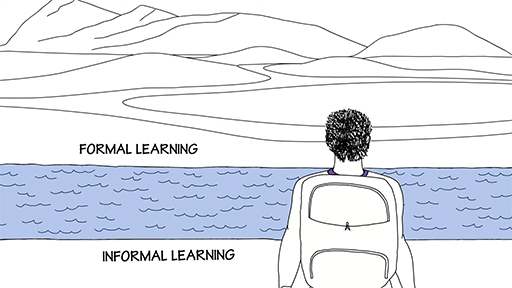3.1 Open YXM modules
Did you know we also offer Open modules which you can count towards your Open qualification? These modules are unique and allow students to personalise their study. Currently there are two Open modules:
- Undergraduate module: Making your learning count (YXM130)
- Postgraduate module: Advance your independent learning (YXM830)
YXM130 is an OU Level 1 module that allows you to count different forms of study, like OpenLearn courses (including this one), professional qualifications, Coursera and other Open Educational Resources (OERs) towards a formal OU qualification, including the Open degree. You can find out a little more about YXM130 by visiting here [Tip: hold Ctrl and click a link to open it in a new tab. (Hide tip)] and by watching the short animation below.
The range of options for building your YXM130 study is endless. To help with the choices, the module team have created some example study pathways to see how you can create your own module.

Transcript: Video 2: Making your learning count
Your learning journey at The Open University may be for pleasure, or you may wish to work towards a formal qualification.
For example, a certificate a diploma or a degree potentially giving you more choices in your career and increasing your income, but whatever journey lies ahead, crossing from informal learning such as taking free courses on OpenLearn, to learning which is formally assessed and costs money can be easier than you think.
'Making your learning count' is a highly flexible OU module, which lets you use informal learning that you may have already completed, to make a start on more formal learning, working towards getting a valuable qualification.
You may have already studied a short OpenLearn course for example in psychology or climate change.
These will be the starting point as you plan your module. With the one-to-one support of a personal tutor you can choose a blend of subjects that interest you, and that could form part of your future learning.
Your assessment for the module is based on a series of tasks such as designing a poster, and making a video about courses you studied, or reflecting on a topic from more than one angle. All these elements put together will make up your first steps in formal learning.
Your tutor will be with you throughout, marking your tasks and giving you invaluable feedback not only earning you credit towards a qualification, but helping to map out your future learning and plan for your ongoing learning journey, at The Open University.
YXM830 is a postgraduate module which is personalised and offers the flexibility of exploring in depth a topic of your choice at Masters level. You can include YXM830 as part of a MA/MSc Open. This module also allows you to draw on different types of learning as a way of advancing your research skills. There’s more on the module here and in this video:

Transcript: Video 3: Advance your independent learning
What if you had the freedom to design your very own module? Think of a question or problem that you’d like to explore. It could be anything, such as 'What are the benefits of outdoor swimming?'.
In time you may well refine your question into something more specific, such as 'How does exercise improve mental health?' The quest to unravel the answer to your question could be the start of a unique journey of study tailored just for you.
It may be that you have a particular challenge in your life, either at home or at work. The module is your chance to answer your own question in a rigorous and structured way.
Working with your tutor on YXM830, you are in the driving seat. You can navigate topics and cross subject disciplines in your own learning adventure. You get a chance to take control of your studies and design and complete your own investigation to suit your own long term objectives.
You’ll be exploring and bringing together information from a wide range of sources and different media: Academic journals, reports, research papers, multimedia content and blogs as well as books.
You can include in your learning time free online courses or professional development courses you’ve already completed.
As well as working with you tutor, you get input from other students taking the module, which gives you different perspectives, as you present your work for feedback at each step of the process.
At the end of the module, you can present your findings in a variety of ways from an animation to an in-depth written report. You'll also have a chance to reflect on your learning journey, how your ability to research and learn independently has improved and how you may use your new skills in other aspects of your life.
What's your question?
.png)